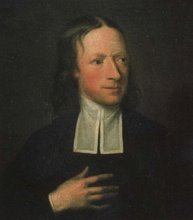To his Brother Samuel
Oxon, March 4, 1735.
DEAR BROTHER, -- I had rather dispute, if I must dispute, with you than with any man living, because it may be done with so little expense of time and words.
The question is now brought to one point, and the whole of the argument will be in a single syllogism:
Neither hope of doing greater good nor fear of any evil ought to deter you from what you have engaged yourself to.
But you have engaged yourself to undertake the cure of a parish:
Therefore neither that hope nor that fear ought to deter you from it.
The only doubt is whether I have engaged myself or not. You think I did at my ordination, ' before God and His high-priest.' I think I did not.
However, I own I am not the proper judge of the oath I then took. It being certain and allowed by all-- 'Verbis in quibus quis jurejurando adigitur, sensum genuinum, ut et obligationem sacramenti et modum et mensuram praestari a mente non praestantis, sed exigentis juramentum.' [The words are probably a quotation from an English Canonist, and have been thus translated: 'To words in which any one is caused to take an oath, the true meaning, and also the manner and extent of the obligation of the oath, is supplied from the mind, not of the taker of the oath, but of him who demands it.' See Journal, i. 29.]
Therefore it is not I, but the high-priest of God before whom I contracted that engagement, who is to judge of the nature and extent of it. Accordingly the post after I received yours I referred it entirely to him,[ Dr. Potter, trs. to Canterbury1737.] proposing this single question to him, Whether I had at my ordination engaged myself to undertake the cure of any parish or no? His answer runs in these words:
REVD. SIR, -- It doth not seem to me that at your ordination you engaged yourself to undertake the cure of any parish, provided you can as a clergyman better serve God and His Church in your present or some other station.
Now, that I can as a clergyman better serve God and His Church in my present station I have all reasonable evidence. [See letters of Feb. 15, 1733, and Dec. 10, 1734.]
Oxon, March 4, 1735.
DEAR BROTHER, -- I had rather dispute, if I must dispute, with you than with any man living, because it may be done with so little expense of time and words.
The question is now brought to one point, and the whole of the argument will be in a single syllogism:
Neither hope of doing greater good nor fear of any evil ought to deter you from what you have engaged yourself to.
But you have engaged yourself to undertake the cure of a parish:
Therefore neither that hope nor that fear ought to deter you from it.
The only doubt is whether I have engaged myself or not. You think I did at my ordination, ' before God and His high-priest.' I think I did not.
However, I own I am not the proper judge of the oath I then took. It being certain and allowed by all-- 'Verbis in quibus quis jurejurando adigitur, sensum genuinum, ut et obligationem sacramenti et modum et mensuram praestari a mente non praestantis, sed exigentis juramentum.' [The words are probably a quotation from an English Canonist, and have been thus translated: 'To words in which any one is caused to take an oath, the true meaning, and also the manner and extent of the obligation of the oath, is supplied from the mind, not of the taker of the oath, but of him who demands it.' See Journal, i. 29.]
Therefore it is not I, but the high-priest of God before whom I contracted that engagement, who is to judge of the nature and extent of it. Accordingly the post after I received yours I referred it entirely to him,[ Dr. Potter, trs. to Canterbury1737.] proposing this single question to him, Whether I had at my ordination engaged myself to undertake the cure of any parish or no? His answer runs in these words:
REVD. SIR, -- It doth not seem to me that at your ordination you engaged yourself to undertake the cure of any parish, provided you can as a clergyman better serve God and His Church in your present or some other station.
Now, that I can as a clergyman better serve God and His Church in my present station I have all reasonable evidence. [See letters of Feb. 15, 1733, and Dec. 10, 1734.]
Subscribe to:
Post Comments (Atom)

No comments:
Post a Comment